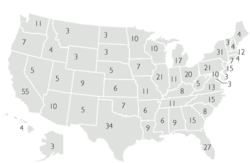
Blogging Domains For Sale
Bidding opens at: $100
Doughmain: http://www.ElectoralBlogger.com
Bidding will ensue in auction-fashion and will remain open until buyer & seller agree on a final price. Should you wish to make a "Buy Now" bid, please indicate in your email that your price is final.
Please email all bids/inquires to: blogdomains@gmail.com
An electoral college is a set of electors who are empowered as a deliberative body to elect someone to a particular office. Often these electors represent a different organization or entity with each organization or entity represented by a particular number of electors or with votes weighted in a particular way. Many times, though, the electors are simply important persons whose wisdom, it is hoped, would provide a better choice than a larger body.
Electoral colleges are an ancient institution. Ancient Germanic law stated that the Germanic king led only with the support of his nobles. Thus Pelayo needed to be elected by his Visigothic nobles before becoming king of Asturias, and so did with the Frankish nobles in order to become the first Carolingian king. While most other Germanic nations went to a strictly hereditary system by the first millennium, the Holy Roman Empire could not, and the King of the Romans, who would become Holy Roman Emperor or at least Emperor-elect, was selected by the college of prince-electors from the late Middle Ages until 1806.
Christianity also used electoral colleges in ancient times, but not until late antiquity. Initially, the entire membership of a particular church (both the clergy and laity) elected the bishop/chief presbyter. However, due to various reasons, such as reducing the influence of the state in church matters or removing the laity's voice in the matter, the electing power moved to the clergy alone and then, in the case of the Western Church, to only a college of the canons of the cathedral church. In the Pope's case, the system of people and clergy was eventually replaced by a college of the important clergy of Rome, which eventually evolved into the College of Cardinals. Since 1059, it has had exclusive authority over papal elections.

No comments:
Post a Comment